Michael Offutt's Blog, page 69
July 27, 2018
Debussey's Clair de Lune heightens the awe you feel when watching the trailer for Godzilla: King of the Monsters.
 The trailer for Godzilla: King of the Monsters features Claude Debussy's classical suite called Clair de Lune, which is French for moonlight. It's an unusual score, and this version of it from Imagine entertainment seems to be a perfect fit for the majesty of these enormous monsters. In Japan, they are known as kaiju, which is Japanese for "strange beast." But in the movie, the Warner Brothers shared universe for these films is going with "Titans," which evokes inevitable comparisons to godhood. I suppose if such creatures did exist, there would be some that would worship them as gods. This is the whole point of Mothra (my favorite kaiju) who unfurls her wings in a perfect emotional height of the musical score. I can only imagine that when this thing appeared in Hall H at San Diego Comic Con, the crowd must have shook the building with their enthusiasm. It really is one amazing trailer.
The trailer for Godzilla: King of the Monsters features Claude Debussy's classical suite called Clair de Lune, which is French for moonlight. It's an unusual score, and this version of it from Imagine entertainment seems to be a perfect fit for the majesty of these enormous monsters. In Japan, they are known as kaiju, which is Japanese for "strange beast." But in the movie, the Warner Brothers shared universe for these films is going with "Titans," which evokes inevitable comparisons to godhood. I suppose if such creatures did exist, there would be some that would worship them as gods. This is the whole point of Mothra (my favorite kaiju) who unfurls her wings in a perfect emotional height of the musical score. I can only imagine that when this thing appeared in Hall H at San Diego Comic Con, the crowd must have shook the building with their enthusiasm. It really is one amazing trailer.So a little history on Clair de lune. First it was originally intended to go into an animation sequence for Fantasia, but it was not included in the final cut of the film due to running time issues. It is the third and most famous movement of Suite bergamesque, and I've heard it mostly played via piano. It really is a fantastic piece of music, and it has me in awe that it fits so well with these gigantic monsters on screen. Is it awe? I think that has to be it, because the sheer size and power of the kaiju is awe-inspiring unto itself so why not evoke awe in the music as well? In my humble opinion, it is a brilliant directorial choice.
There is so much destruction in this trailer, and it definitely has an "end of the world" feel to it (as it should be). I've read online that King Ghidorah creates a hurricane everywhere he goes because of interactions of the energies (that power his breath weapons) with the atmosphere. Personally, Ghidorah is a fantastic villain for this show, and it totally ups the stakes on anything that we've seen in the first Godzilla movie that came out in 2014. Predictions: Mothra and Rodan (after Rodan goes around destroying a few things for fun) will join forces with Godzilla to take down King Ghidorah. In the words of Ken Wattanabe (from the first film), "Let them fight," not that there's much of a choice in this matter. They're essentially immune to everything.
Random thought: Have you noticed that Millie Bobby Brown from Stranger Things is staring at the sky a lot in her career in both Netflix's Stranger Things and now this? I think she was meant to be a sky watcher.
If you haven't seen this trailer yet, I encourage you to click on it below and watch.
Published on July 27, 2018 06:57
July 24, 2018
Most people seem to hate the Titans trailer that broke at San Diego Comic Con but I seriously love it
 DC's Titans is a gritty and dark story. I don't understand why people are upset that the upcoming trailer for the live-action Titans on DC's streaming service is dark. Something tells me that it probably has a lot to do with Teen Titans GO! I think I was able to watch only a single episode of that show before I just shook my head and said, "I've no idea why this is even a thing" and then turned it off.
DC's Titans is a gritty and dark story. I don't understand why people are upset that the upcoming trailer for the live-action Titans on DC's streaming service is dark. Something tells me that it probably has a lot to do with Teen Titans GO! I think I was able to watch only a single episode of that show before I just shook my head and said, "I've no idea why this is even a thing" and then turned it off.I used to collect the New Teen Titans comic books in the eighties. They started out with a story about Raven being the daughter of Trigon the Terrible, a malefic entity that had the power to destroy all of creation and make it into a Hell on Earth. He was incredibly powerful, essentially the ruler of Hell. How on earth do you make Raven into what she is on Teen Titans GO!? I've no idea, but apparently they did, and it seemed to work.
Those issues (drawn by George Perez with a story by Marv Wolfman) were some of the best I have ever read. They followed up with fifty issues of incredible storylines, introducing characters that became villains (like Terra) and dealing with real teen angst and some stories that were very similar to what we see in Riverdale (the Archie comics series on the CW). It was some very adult stuff. Furthermore, Perez started to change Raven's appearance in subtle ways after the Titans first encounter with Trigon the Terrible. Her face started to get longer, and she wore her cowl more and more to hide the physical changes that were happening to her. It was a thing that took many issues and went on for years, and it was so slow that you really didn't notice until it was pointed out in issue 50 when Cyborg was talking to Nightwing (I think) and showed Nightwing on the computer just how much Raven had changed in the years they'd known her. All of this (of course) pointed to something BIG that was headed their way.
There was so much character development. Dick Grayson (as Nightwing) had enormous emotional baggage left over from his time with the Batman. I could totally believe it when he said, "F*ck Batman" in the trailer, because this is obviously the way that the show's creators are going. And Princess Koriandr, a.k.a. Starfire, fell in love with him and the romance was great. Anyway, after seeing the trailer, I'm really looking forward to this series, and I've no idea why it's getting panned so much online. I think people somehow forgot that Titans is a DARK storyline. It isn't supposed to be campy. Raven's storyline in particular is the backbone of the whole thing, because it's her storyline that essentially dooms the entire world. No one can beat Trigon. In issue 50, when Trigon came back to Earth, he enslaved legions of superheroes. Superman was nothing to Trigon, nor was the Justice League. He's easily as big a villain as Thanos is to the Marvel universe (or on that same level of power).
Anyway, this post is just a little rant. Overall, I'm happy that the showrunner is taking cues from the Titans source material (the actual comic books) and not Teen Titans Go! I've put the trailer below if you haven't seen it. For what it's worth, I think the casting is really good. I just wish that the forces that decry DC for being "too dark" would just go away.
Published on July 24, 2018 23:31
July 22, 2018
San Diego Comic Con is the king of conventions but it is logistically impossible for most fans to see any of the good panels.
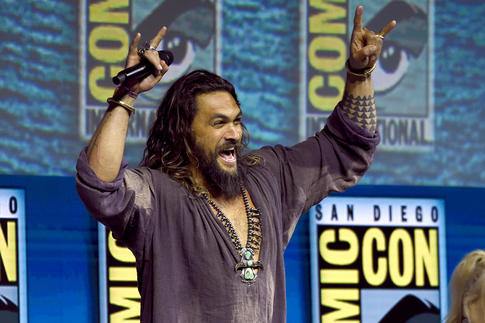 This weekend, San Diego Comic Con exploded the internet with all kinds of stuff that I'm interested in. There was the first trailer for Aquaman, the first trailer for Godzilla: King of the Monsters, new trailers for Fantastic Beasts: The Crimes of Grindelwald, the first Shazam! trailer, the first trailer for the second season of Star Trek: Discovery, and a bunch of stuff for television. The only problem is that everyone else in the world also finds these things interesting. Nerd and geek culture is obnoxiously huge these days, and it's not hard to see why. Simply put, the kinds of things we are able to visualize (thanks to the power of computers) is nothing short of pure fantasy. Anything that can be thought up can be realized (if it is able to be drawn). It's kind of crazy.
This weekend, San Diego Comic Con exploded the internet with all kinds of stuff that I'm interested in. There was the first trailer for Aquaman, the first trailer for Godzilla: King of the Monsters, new trailers for Fantastic Beasts: The Crimes of Grindelwald, the first Shazam! trailer, the first trailer for the second season of Star Trek: Discovery, and a bunch of stuff for television. The only problem is that everyone else in the world also finds these things interesting. Nerd and geek culture is obnoxiously huge these days, and it's not hard to see why. Simply put, the kinds of things we are able to visualize (thanks to the power of computers) is nothing short of pure fantasy. Anything that can be thought up can be realized (if it is able to be drawn). It's kind of crazy.The dark side of all this is that a regular schlub like me has absolutely no chance of seeing any of this at San Diego Comic Con. I've never been there to verify this truth, but when I read about what people have to do in order to get into these events and forums, it's just seems downright impossible. There are people that camp out for a week just to get into a specific hall. And this has nothing to do with getting a ticket, which is probably impossible to get as well without some kind of super duper internet connection.
Anyway, it seems like the enjoyment of these kinds of things has really moved onto, "If you want to hear the news first, you need to subscribe to this online magazine or twitter feed and follow me so that I can get it for you." I guess I'm complaining that I wish it wasn't this way. I wish that people who legitimately were interested in these kinds of events could (without too much trouble) get a ticket and then show up at a hall about 30 minutes before an event aired, and then get to see (and hear) all the cool stuff. But there's just too many people for the San Diego event center to handle (and the event center is reportedly enormous). So to simplify...there's just too many people...and that kind of sucks. Unofficially, I've heard that one million people attempt to purchase 55,000 passes.
So I guess I'll just continue reading about these things online and wishing that someday, I might see it live. But I doubt it. I just don't have the stamina to camp out for a week to get into a hall for an event panel.
Published on July 22, 2018 23:07
July 19, 2018
There are a lot of boy and robot team up stories and I wonder if the appeal is control.
I watched Terminator 2 last night with the kids who I am slowly educating on the most relevant movies ever made. As Edward Furlong (playing John Conner) interacted with Schwarzenegger's Terminator Cyberdyne model series T-800 Model 101 (living tissue over robotic inner skeleton) I realized that there are a lot of stories that share this same theme.
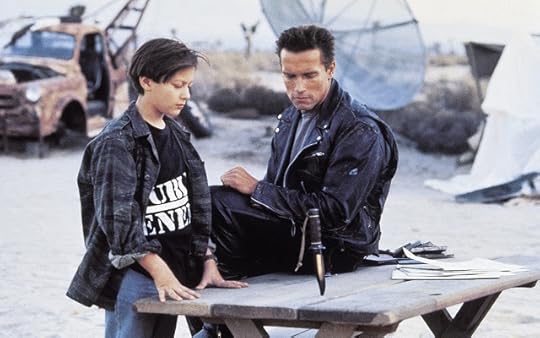 We have Lost in Space, with the kid named Will Robinson interacting with Robbie the Robot. In the Netflix reboot, the robot is every bit as kickass as the terminator is in Terminator 2 (the best Terminator movie in my opinion), because it is nigh indestructible, relentless to its mission, and is always there at the beck and call of its master.
We have Lost in Space, with the kid named Will Robinson interacting with Robbie the Robot. In the Netflix reboot, the robot is every bit as kickass as the terminator is in Terminator 2 (the best Terminator movie in my opinion), because it is nigh indestructible, relentless to its mission, and is always there at the beck and call of its master.
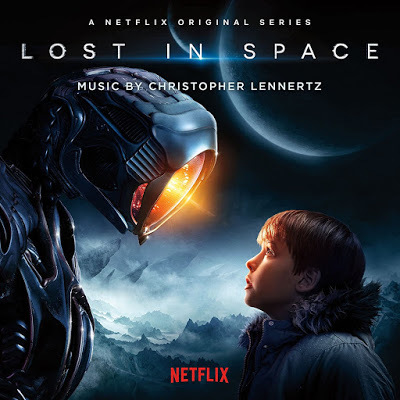 Then there's Big Hero Six, a Disney animated movie, in which Baymax (programmed originally to be a medical assistant) also takes on the role of being nigh indestructible, pretty relentless, and at the beck and call of the kid who controls him.
Then there's Big Hero Six, a Disney animated movie, in which Baymax (programmed originally to be a medical assistant) also takes on the role of being nigh indestructible, pretty relentless, and at the beck and call of the kid who controls him.
 Need another example? How about Real Steel? In this one, the robot doesn't even have a personality as it's completely under the control of the kid. Without the kid, it really is useless. And thinking about this made me realize the allure of robots to boys and men (acknowledging that you really don't see girls and women wanting to interact with robots). So what's it about? My idea is simple. It's about control. It's an instinctual desire...meaning that I don't think that boys necessarily and cognitively process that they want 100% control over something. Rather, it's just something that manifests. "I want complete control over _____." It's a strange almost primordial urge to recognize dominance, and (honestly) now that I realize it, this whole idea is kind of weirding me out.
Need another example? How about Real Steel? In this one, the robot doesn't even have a personality as it's completely under the control of the kid. Without the kid, it really is useless. And thinking about this made me realize the allure of robots to boys and men (acknowledging that you really don't see girls and women wanting to interact with robots). So what's it about? My idea is simple. It's about control. It's an instinctual desire...meaning that I don't think that boys necessarily and cognitively process that they want 100% control over something. Rather, it's just something that manifests. "I want complete control over _____." It's a strange almost primordial urge to recognize dominance, and (honestly) now that I realize it, this whole idea is kind of weirding me out.
 At my work, I sometimes interact with children with autism. A lot of them do not possess social skills, and they also dislike or refuse to work with people. However, they will interact with a robot that we have that has the ability to talk, move, and make many facial expressions. While interacting with the robot, the children can learn from it. The curriculum is under the control of a teacher who has an iPad, but the robot is also under the control of the student (who also has an iPad). Oh, and by a huge margin, boys seem to like interacting with the robot over girls (in my admittedly small sample size). Then again, I really haven't seen too many girls with autism (it's mostly boys that seem to get it for some reason).
At my work, I sometimes interact with children with autism. A lot of them do not possess social skills, and they also dislike or refuse to work with people. However, they will interact with a robot that we have that has the ability to talk, move, and make many facial expressions. While interacting with the robot, the children can learn from it. The curriculum is under the control of a teacher who has an iPad, but the robot is also under the control of the student (who also has an iPad). Oh, and by a huge margin, boys seem to like interacting with the robot over girls (in my admittedly small sample size). Then again, I really haven't seen too many girls with autism (it's mostly boys that seem to get it for some reason).
So why is this happening? No one knows for sure, but I'm starting to think that kids with autism don't want to interact with real humans because (at some level) they know that this human they are interacting with does not belong to them. They do not get to boss around the human. They do not get to control the human. And so, they choose to completely shut down because this "lack of control" is too much to deal with.
As usual with my crackpot theories that I spout off on this blog, I could be completely in the wrong here, but I feel like I'm onto something. What is it about being male that expresses itself in wanting to control a thing of some kind utterly and completely? As evident in this post, I'm not sure what it is. The only thing I am sure of is that females don't seem to have it in as much abundance. Maybe that's one reason why video games and computers tend to have a much larger male base than female. Males are drawn to worlds that they can control utterly and completely down to the smallest hair waving in a phantom wind to however many leafs there are on a tree in a video game.
Any thoughts on this? Has anyone else done some armchair observation and noticed that men seem to have an inner control freak? I wonder if more male authors self-publish than females? Self-publishing gives complete and utter control to the one publishing, and if I'm right, it would mean that this would be very appealing to males in general. All of these questions are too big for my little blog, but I am interested in your viewpoint. And of course, by next week I will have moved onto something else to think on, having given this particular idea more than a few passing thoughts.
 We have Lost in Space, with the kid named Will Robinson interacting with Robbie the Robot. In the Netflix reboot, the robot is every bit as kickass as the terminator is in Terminator 2 (the best Terminator movie in my opinion), because it is nigh indestructible, relentless to its mission, and is always there at the beck and call of its master.
We have Lost in Space, with the kid named Will Robinson interacting with Robbie the Robot. In the Netflix reboot, the robot is every bit as kickass as the terminator is in Terminator 2 (the best Terminator movie in my opinion), because it is nigh indestructible, relentless to its mission, and is always there at the beck and call of its master. Then there's Big Hero Six, a Disney animated movie, in which Baymax (programmed originally to be a medical assistant) also takes on the role of being nigh indestructible, pretty relentless, and at the beck and call of the kid who controls him.
Then there's Big Hero Six, a Disney animated movie, in which Baymax (programmed originally to be a medical assistant) also takes on the role of being nigh indestructible, pretty relentless, and at the beck and call of the kid who controls him. Need another example? How about Real Steel? In this one, the robot doesn't even have a personality as it's completely under the control of the kid. Without the kid, it really is useless. And thinking about this made me realize the allure of robots to boys and men (acknowledging that you really don't see girls and women wanting to interact with robots). So what's it about? My idea is simple. It's about control. It's an instinctual desire...meaning that I don't think that boys necessarily and cognitively process that they want 100% control over something. Rather, it's just something that manifests. "I want complete control over _____." It's a strange almost primordial urge to recognize dominance, and (honestly) now that I realize it, this whole idea is kind of weirding me out.
Need another example? How about Real Steel? In this one, the robot doesn't even have a personality as it's completely under the control of the kid. Without the kid, it really is useless. And thinking about this made me realize the allure of robots to boys and men (acknowledging that you really don't see girls and women wanting to interact with robots). So what's it about? My idea is simple. It's about control. It's an instinctual desire...meaning that I don't think that boys necessarily and cognitively process that they want 100% control over something. Rather, it's just something that manifests. "I want complete control over _____." It's a strange almost primordial urge to recognize dominance, and (honestly) now that I realize it, this whole idea is kind of weirding me out. At my work, I sometimes interact with children with autism. A lot of them do not possess social skills, and they also dislike or refuse to work with people. However, they will interact with a robot that we have that has the ability to talk, move, and make many facial expressions. While interacting with the robot, the children can learn from it. The curriculum is under the control of a teacher who has an iPad, but the robot is also under the control of the student (who also has an iPad). Oh, and by a huge margin, boys seem to like interacting with the robot over girls (in my admittedly small sample size). Then again, I really haven't seen too many girls with autism (it's mostly boys that seem to get it for some reason).
At my work, I sometimes interact with children with autism. A lot of them do not possess social skills, and they also dislike or refuse to work with people. However, they will interact with a robot that we have that has the ability to talk, move, and make many facial expressions. While interacting with the robot, the children can learn from it. The curriculum is under the control of a teacher who has an iPad, but the robot is also under the control of the student (who also has an iPad). Oh, and by a huge margin, boys seem to like interacting with the robot over girls (in my admittedly small sample size). Then again, I really haven't seen too many girls with autism (it's mostly boys that seem to get it for some reason).So why is this happening? No one knows for sure, but I'm starting to think that kids with autism don't want to interact with real humans because (at some level) they know that this human they are interacting with does not belong to them. They do not get to boss around the human. They do not get to control the human. And so, they choose to completely shut down because this "lack of control" is too much to deal with.
As usual with my crackpot theories that I spout off on this blog, I could be completely in the wrong here, but I feel like I'm onto something. What is it about being male that expresses itself in wanting to control a thing of some kind utterly and completely? As evident in this post, I'm not sure what it is. The only thing I am sure of is that females don't seem to have it in as much abundance. Maybe that's one reason why video games and computers tend to have a much larger male base than female. Males are drawn to worlds that they can control utterly and completely down to the smallest hair waving in a phantom wind to however many leafs there are on a tree in a video game.
Any thoughts on this? Has anyone else done some armchair observation and noticed that men seem to have an inner control freak? I wonder if more male authors self-publish than females? Self-publishing gives complete and utter control to the one publishing, and if I'm right, it would mean that this would be very appealing to males in general. All of these questions are too big for my little blog, but I am interested in your viewpoint. And of course, by next week I will have moved onto something else to think on, having given this particular idea more than a few passing thoughts.
Published on July 19, 2018 23:06
July 16, 2018
I think that the new direction Star Wars is headed will be a place where good and evil are just words and everything depends on a certain point of view.
 I watched The Last Jedi again on Sunday night with my father. He hadn't seen it, but has been a fan of the Star Wars franchise for some time. Now that I've had some distance from my initial viewing of it in theaters, and have watched Solo: A Star Wars story and finished watching Star Wars: Rebels, I actually found that I liked The Last Jedi a lot more than I initially did. This was a kind of strange reaction as I think I was kind of immediately outraged that everything was so incredibly different than I expected.
I watched The Last Jedi again on Sunday night with my father. He hadn't seen it, but has been a fan of the Star Wars franchise for some time. Now that I've had some distance from my initial viewing of it in theaters, and have watched Solo: A Star Wars story and finished watching Star Wars: Rebels, I actually found that I liked The Last Jedi a lot more than I initially did. This was a kind of strange reaction as I think I was kind of immediately outraged that everything was so incredibly different than I expected.It still isn't a movie that I would ever want to own, primarily because it's not a feel good movie. I also don't own a copy of Schindler's List for anyone that's been wondering about that. But The Last Jedi deserves more credit that the thrashing it has been given by fanboys online. For one, it's well put together. The script is coherent from beginning to end, the dialogue makes sense, and it wastes no time with confusing escapades or dealing with metaphors. Additionally, I'm more appreciative of the way in which Luke and others (Yoda) poke fun at the seriousness with which the Jedi have been treated for decades. The way he tosses the lightsaber over his shoulder, the way Yoda casually berates Luke for not picking up the "page turners" that were the Jedi histories, and the way Snoke berates Kylo Ren about his helmet. "Take that ridiculous thing off."
Favorite lines: Rey telling Luke, "I've seen your daily routine. You're not busy."
It's funny stuff. There's also more hope buried within its carefully constructed script than I originally gave it credit for having. It seemed like Disney just took a jackhammer and wrecking ball to everything. But there's all kinds of kernels hidden in the narrative that point to a new kind of story that can be told...one in which kids who are not a part of the Jedi order learn to use the Force because the Force "doesn't belong to anyone." I liked that line that seemed like it was a throwaway the first time I saw it (when Luke is teaching Rey who is sitting on rock). "The Force doesn't belong to anyone." It's an interesting concept and it pushes the idea that all this training and rules and discipline and everything else were just made up things meant to constrict people who should have felt free to access the Force and use it however they want (if they had the talent).
Even the code breaker says as much in his worldview. "Good guy, bad guy...those are just words." It's weird to think that Star Wars, the iconic franchise of good versus evil, is starting to embrace the idea that "good" and "evil" are just concepts. What is "good" and what is "evil" is entirely dependent on a certain point-of-view. At least, that's what I'm getting as The Last Jedi's most prevalent kernel that underlies the whole movie and story. It's probably the direction that they are going to go in the next movie, and it makes me wonder what it may look like.
George R.R. Martin is also a believer that "good" and "evil" are just words. Instead, it's motivations that matter (and the philosophies and actions that take place behind those motivations). Am I thinking that we may see a Star Wars that resembles something more like what we see in Game of Thrones, only in space? I'm not so sure. But it may end up resembling a universe in which countless stories can be told with they dynamics, say, somewhere between Star Wars and Game of Thrones. It'll be a place where good and evil are just words, and who you side with will depend on the framing provided by the script.
I will not be posting on Wednesday, but I will be back this Friday .
Published on July 16, 2018 08:39
July 12, 2018
I get to introduce some kids to the Alien universe so let's all celebrate by feasting on some really great fan art.
Because my mind sometimes ruminates on dark thoughts, and also because I've gotten permission from the mom of the two teens that watch movies with me to introduce them to the Alien franchise, I'm posting some of my favorite fan art that has been created over the years to celebrate Alien. Enjoy.
 by Rory Kurtz
by Rory Kurtz
 By Mike Saputo
By Mike Saputo
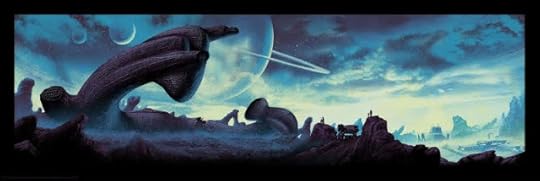 By Mark Englert
By Mark Englert
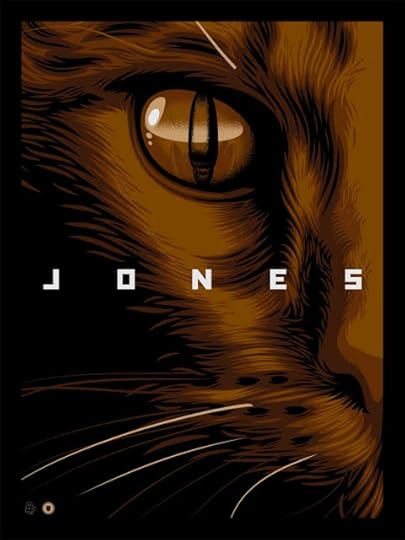 By Thomas Walker
By Thomas Walker
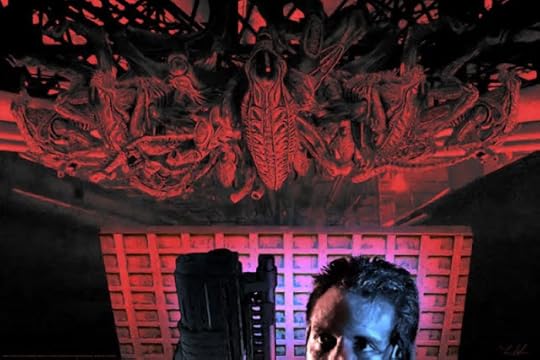 By Louis Solis
By Louis Solis
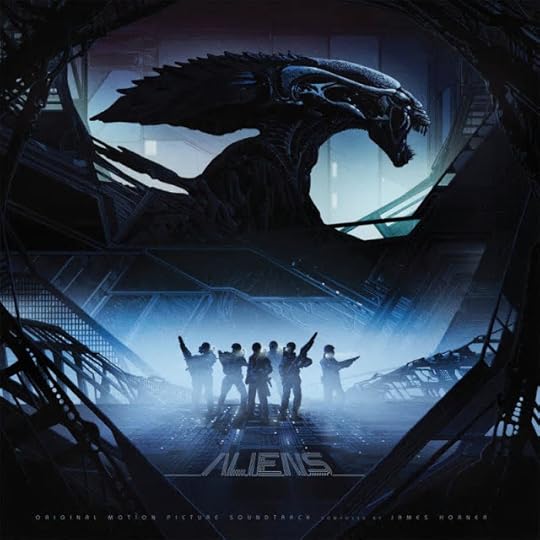 Soundtrack artwork from Mondo
Soundtrack artwork from Mondo
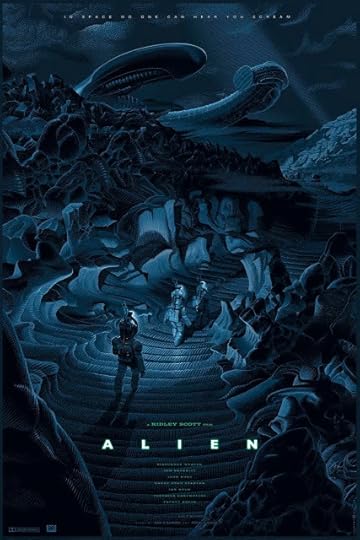 By Laurent Durleux
By Laurent Durleux
 by Rory Kurtz
by Rory Kurtz By Mike Saputo
By Mike Saputo By Mark Englert
By Mark Englert By Thomas Walker
By Thomas Walker By Louis Solis
By Louis Solis Soundtrack artwork from Mondo
Soundtrack artwork from Mondo By Laurent Durleux
By Laurent Durleux
Published on July 12, 2018 23:02
July 10, 2018
The female pac-man figure in Catana comics acts like an infant most of the time and it bothers me.
I have a few friends that share Catana comics on Facebook. If you don't know what these are, they are comic strips about what it's like to have a heterosexual millennial relationship in today's world, only drawn with "Pac-Man"-esque faces. When my friend James asked me if I liked them, I realized with a strange sudden-ness that I did not. Of course, he was baffled. "Why not? They are so cute? Are they too saccharin for you?"
 I had to think about it. No, they are not too sweet. I think the reason I didn't like them was that the presumption is that this is how a healthy modern relationship is supposed to be, yet the woman element (in particular) is infantilized. In other words, if you step back from it and look at the comic aware of your bias, I think you can see that nearly every panel has the woman acting like an adolescent child. We see it as "cute" and "saccharin" because of the nature of childhood. Of course, we don't actually know what any of these people would look like in a real world because it's a comic book. It's really a perfect storm, because it creates a "Mary Sue" element similar to what the author did in the Twilight books by giving us a protagonist that was so plain anyone could step into the role. In other words, Any one person can immediately step into the "pants" of these characters and assume "hey this is me." That's actually kind of brilliant from a pure marketing "let's make a goose that lays golden eggs" standpoint. So kudos to the author of these strips.
I had to think about it. No, they are not too sweet. I think the reason I didn't like them was that the presumption is that this is how a healthy modern relationship is supposed to be, yet the woman element (in particular) is infantilized. In other words, if you step back from it and look at the comic aware of your bias, I think you can see that nearly every panel has the woman acting like an adolescent child. We see it as "cute" and "saccharin" because of the nature of childhood. Of course, we don't actually know what any of these people would look like in a real world because it's a comic book. It's really a perfect storm, because it creates a "Mary Sue" element similar to what the author did in the Twilight books by giving us a protagonist that was so plain anyone could step into the role. In other words, Any one person can immediately step into the "pants" of these characters and assume "hey this is me." That's actually kind of brilliant from a pure marketing "let's make a goose that lays golden eggs" standpoint. So kudos to the author of these strips.
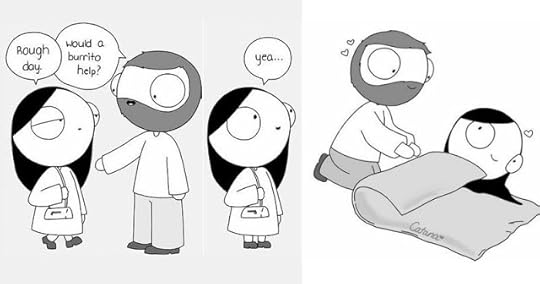
And make no mistake, Catana comics are popular and are only getting more so day after day. I find this phenomenon to be weird, and because I have a curious mind, I want to ask questions. It makes me psychoanalyze the audience of these comics for purely academic reasons. In other words, I'm not trying to be judgmental. People are free to express their love in any way they wish to in my book. But those who might be delighted by these comic strips could possibly fall into a few camps, and I'd like to discuss those in depth below.
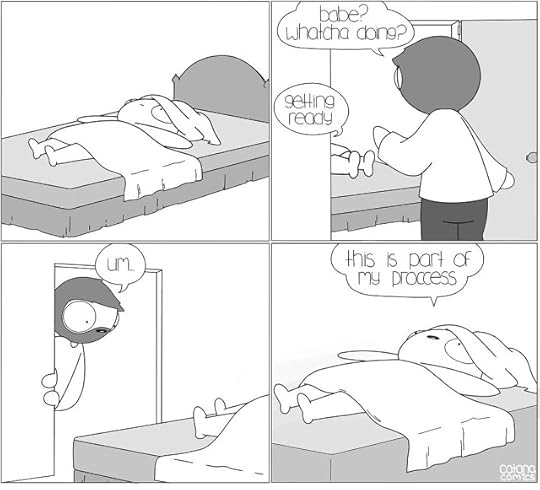 The first camp is the atypical straight guy (lone wolf alpha male) that only likes women, period. Here's a person that might love the idea of having a partner who is childish and struggles to put on clothes, who struggles to make choices, who is short, easily confused, and reliant on him to act as the adult in the relationship. These kinds of guys are probably going to love reading Catana comics, because it reinforces a kind of worldview that they find comfortable.
The first camp is the atypical straight guy (lone wolf alpha male) that only likes women, period. Here's a person that might love the idea of having a partner who is childish and struggles to put on clothes, who struggles to make choices, who is short, easily confused, and reliant on him to act as the adult in the relationship. These kinds of guys are probably going to love reading Catana comics, because it reinforces a kind of worldview that they find comfortable.
The second camp is the straight woman who secretly desires a level of codependency, which is where the man is not only a lover and boyfriend but takes on several of the responsibilities normally associated with a "daddy." It's actually kind of fascinating, especially in today's world which is filled with all kinds of headwinds from searches for equality to society-wide anxieties that arise from a myriad of issues.
The third camp are going to consist of people who are no longer children but look back at their adolescent years through a lens of relationship envy--envy because it felt cozy because both partners were (effectively) children and didn't worry about bills or any responsibilities. In fact, there are no responsibilities at all in Catana comics. That real-world stuff exists beyond its borders. It's a place where only physical interaction (in the same way that children poke and prod at the world) matters. They only needed to figure out how to tolerate each other's farts and burps and laugh about that the way that children laugh at things.
The fourth (and final) camp belongs to people who suffer from (diagnosable?) chronic anxiety. These comics are like comfort food, indulging an idealized version of a childhood fantasy. It's the ultimate "I want to retreat to my pillow fort now and suck my thumb" expression combined with a desire to be taken care of by someone else.
 I think that Catana comics are a perfect product for the times in which we live. The world feels like it is getting worse, unless you are part of the #MAGA crowd (at which point then the world probably feels great). I have many Trump-ian friends, and I don't understand...I don't understand any of it...but whatever. Maybe I wasn't meant to understand, and that isn't the point of this post. My brain just doesn't work that way. But for those who aren't part of that crowd, the world feels hotter and more miserable, more dangerous, more filled with hatred, brimming with intolerance, and with undercurrents that hint at the coming of some truly lasting evils that, to be fair, have always plagued mankind but in this circumstance it just feels different. Into all of this drops a comic strip which promises a return to childhood innocence, where one partner is enough to protect the obviously weaker one, and nothing else dares to intrude upon their idealistic existence. I get why they are popular. However, the reason behind that popularity is why I don't like them. In the end, I wish there were fewer adults in our country who desired an escape into childhood no matter how terrifying the real world has become.
I think that Catana comics are a perfect product for the times in which we live. The world feels like it is getting worse, unless you are part of the #MAGA crowd (at which point then the world probably feels great). I have many Trump-ian friends, and I don't understand...I don't understand any of it...but whatever. Maybe I wasn't meant to understand, and that isn't the point of this post. My brain just doesn't work that way. But for those who aren't part of that crowd, the world feels hotter and more miserable, more dangerous, more filled with hatred, brimming with intolerance, and with undercurrents that hint at the coming of some truly lasting evils that, to be fair, have always plagued mankind but in this circumstance it just feels different. Into all of this drops a comic strip which promises a return to childhood innocence, where one partner is enough to protect the obviously weaker one, and nothing else dares to intrude upon their idealistic existence. I get why they are popular. However, the reason behind that popularity is why I don't like them. In the end, I wish there were fewer adults in our country who desired an escape into childhood no matter how terrifying the real world has become.
 I had to think about it. No, they are not too sweet. I think the reason I didn't like them was that the presumption is that this is how a healthy modern relationship is supposed to be, yet the woman element (in particular) is infantilized. In other words, if you step back from it and look at the comic aware of your bias, I think you can see that nearly every panel has the woman acting like an adolescent child. We see it as "cute" and "saccharin" because of the nature of childhood. Of course, we don't actually know what any of these people would look like in a real world because it's a comic book. It's really a perfect storm, because it creates a "Mary Sue" element similar to what the author did in the Twilight books by giving us a protagonist that was so plain anyone could step into the role. In other words, Any one person can immediately step into the "pants" of these characters and assume "hey this is me." That's actually kind of brilliant from a pure marketing "let's make a goose that lays golden eggs" standpoint. So kudos to the author of these strips.
I had to think about it. No, they are not too sweet. I think the reason I didn't like them was that the presumption is that this is how a healthy modern relationship is supposed to be, yet the woman element (in particular) is infantilized. In other words, if you step back from it and look at the comic aware of your bias, I think you can see that nearly every panel has the woman acting like an adolescent child. We see it as "cute" and "saccharin" because of the nature of childhood. Of course, we don't actually know what any of these people would look like in a real world because it's a comic book. It's really a perfect storm, because it creates a "Mary Sue" element similar to what the author did in the Twilight books by giving us a protagonist that was so plain anyone could step into the role. In other words, Any one person can immediately step into the "pants" of these characters and assume "hey this is me." That's actually kind of brilliant from a pure marketing "let's make a goose that lays golden eggs" standpoint. So kudos to the author of these strips.
And make no mistake, Catana comics are popular and are only getting more so day after day. I find this phenomenon to be weird, and because I have a curious mind, I want to ask questions. It makes me psychoanalyze the audience of these comics for purely academic reasons. In other words, I'm not trying to be judgmental. People are free to express their love in any way they wish to in my book. But those who might be delighted by these comic strips could possibly fall into a few camps, and I'd like to discuss those in depth below.
 The first camp is the atypical straight guy (lone wolf alpha male) that only likes women, period. Here's a person that might love the idea of having a partner who is childish and struggles to put on clothes, who struggles to make choices, who is short, easily confused, and reliant on him to act as the adult in the relationship. These kinds of guys are probably going to love reading Catana comics, because it reinforces a kind of worldview that they find comfortable.
The first camp is the atypical straight guy (lone wolf alpha male) that only likes women, period. Here's a person that might love the idea of having a partner who is childish and struggles to put on clothes, who struggles to make choices, who is short, easily confused, and reliant on him to act as the adult in the relationship. These kinds of guys are probably going to love reading Catana comics, because it reinforces a kind of worldview that they find comfortable.The second camp is the straight woman who secretly desires a level of codependency, which is where the man is not only a lover and boyfriend but takes on several of the responsibilities normally associated with a "daddy." It's actually kind of fascinating, especially in today's world which is filled with all kinds of headwinds from searches for equality to society-wide anxieties that arise from a myriad of issues.
The third camp are going to consist of people who are no longer children but look back at their adolescent years through a lens of relationship envy--envy because it felt cozy because both partners were (effectively) children and didn't worry about bills or any responsibilities. In fact, there are no responsibilities at all in Catana comics. That real-world stuff exists beyond its borders. It's a place where only physical interaction (in the same way that children poke and prod at the world) matters. They only needed to figure out how to tolerate each other's farts and burps and laugh about that the way that children laugh at things.
The fourth (and final) camp belongs to people who suffer from (diagnosable?) chronic anxiety. These comics are like comfort food, indulging an idealized version of a childhood fantasy. It's the ultimate "I want to retreat to my pillow fort now and suck my thumb" expression combined with a desire to be taken care of by someone else.
 I think that Catana comics are a perfect product for the times in which we live. The world feels like it is getting worse, unless you are part of the #MAGA crowd (at which point then the world probably feels great). I have many Trump-ian friends, and I don't understand...I don't understand any of it...but whatever. Maybe I wasn't meant to understand, and that isn't the point of this post. My brain just doesn't work that way. But for those who aren't part of that crowd, the world feels hotter and more miserable, more dangerous, more filled with hatred, brimming with intolerance, and with undercurrents that hint at the coming of some truly lasting evils that, to be fair, have always plagued mankind but in this circumstance it just feels different. Into all of this drops a comic strip which promises a return to childhood innocence, where one partner is enough to protect the obviously weaker one, and nothing else dares to intrude upon their idealistic existence. I get why they are popular. However, the reason behind that popularity is why I don't like them. In the end, I wish there were fewer adults in our country who desired an escape into childhood no matter how terrifying the real world has become.
I think that Catana comics are a perfect product for the times in which we live. The world feels like it is getting worse, unless you are part of the #MAGA crowd (at which point then the world probably feels great). I have many Trump-ian friends, and I don't understand...I don't understand any of it...but whatever. Maybe I wasn't meant to understand, and that isn't the point of this post. My brain just doesn't work that way. But for those who aren't part of that crowd, the world feels hotter and more miserable, more dangerous, more filled with hatred, brimming with intolerance, and with undercurrents that hint at the coming of some truly lasting evils that, to be fair, have always plagued mankind but in this circumstance it just feels different. Into all of this drops a comic strip which promises a return to childhood innocence, where one partner is enough to protect the obviously weaker one, and nothing else dares to intrude upon their idealistic existence. I get why they are popular. However, the reason behind that popularity is why I don't like them. In the end, I wish there were fewer adults in our country who desired an escape into childhood no matter how terrifying the real world has become.
Published on July 10, 2018 23:19
July 8, 2018
Ant-Man and the Wasp is yet another hit and it made me think of these eight things.
 I saw Ant-Man and The Wasp this weekend. I kinda want to discuss it, so there are spoilers ahead. Go and read someone else's blog if you are not a person that wants to talk "spoiler-y content." Also, there really isn't a single theme here. I'm just gathering all my thoughts together in one place.
I saw Ant-Man and The Wasp this weekend. I kinda want to discuss it, so there are spoilers ahead. Go and read someone else's blog if you are not a person that wants to talk "spoiler-y content." Also, there really isn't a single theme here. I'm just gathering all my thoughts together in one place.Assorted Musings regarding Ant-Man and The Wasp and Marvel movies in general (here we go):
1) Marvel is on a roll. By my list, the last four movies released were Thor: Ragnarok, Black Panther, Avengers: Infinity War, and now Ant-Man and the Wasp. I love all of these movies that I own the ones that are available and plan to purchase the ones that aren't available (when they do become available). This is an accomplishment that should be applauded/celebrated. I don't know if it's because they seem to have adopted John Hammond's philosophy from Jurassic Park and "spared no expense" or if they've just gotten lucky, but I'm willing to bet that it has something to do with the former. Money seems to be able to buy quality where these kinds of movies are concerned.
2) I liked that Ghost was an antagonist as opposed to a villain. That was a good decision and was a shift from good versus evil.
3) Scott continues to be the dumbest guy in the room in almost any scene. I think this really works for Marvel because being "dumb" in a Marvel movie opens up a whole side wing to things that people find funny. Think of how Thor is essentially the dumb jock and how well Hemsworth plays into that role.
4) Evangeline Lilly stole the show in every scene that she was in. I also think she's in better shape than Paul Rudd, which is impressive because Paul Rudd is ripped for this role.
5) The first stinger that's almost two minutes long seems to be a direct lead-in to time travel? It seems a little ham-fisted that Janet dropped the whole, "Don't get sucked into a time vortex" thing right before Ant-Man went into the quantum realm without it meaning something. What can we take from this? Well I think the quantum realm is the gateway to undoing everything in Avengers: Infinity War. Once Ant-Man gets big again, figures out what happened, and then tells the remaining Avengers about the quantum realm's unique time vortices, I think we have the plot for Avengers 4: End Game (my nod to a thing Doctor Strange said in Avengers: Infinity War). I also think that the quantum realm is immune to the Infinity Gauntlet's powers.
6) Funniest scene in the movie is Luis's monologue following an injection of truth serum. Also music was spot on. The Baba-Yaga joke was funnier because of the music.
7) Who was Sonny Burch working for? He was stealing the lab for his scary boss. I'm betting that it is Doctor Doom.
8) I dropped two jokes to the teenagers and mom that I went to the show with (oh and friend Brad was also there). I'll share them with you here. 1) Does Ant-Man actually pay the ants that work for him or are they unpaid "ant-terns?" 2) Ant-Man and the Wasp is the ant-ecedent to Avengers: Infinity War. And yes, I came up with both of these jokes.
/takes a bow. Y'all have a good Monday.
Published on July 08, 2018 23:56
July 3, 2018
For Independence Day the Insecure Writer's Support group is asking a question about my ultimate writing goals.
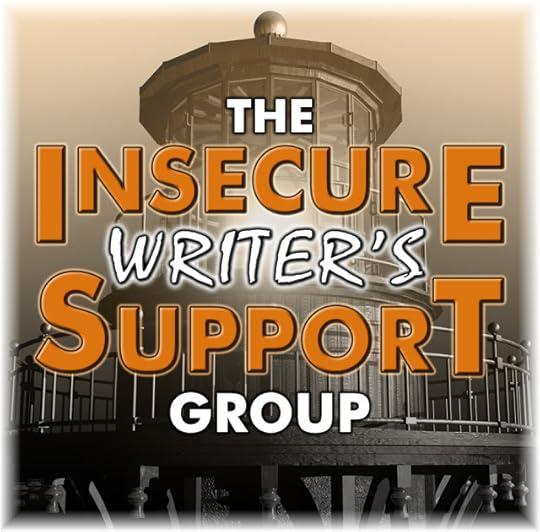 It's Wednesday, July 4th, 2018. and it's time for the Insecure Writer's Support Group post. The website said that everyone was supposed to post Tuesday to avoid the holiday, but I figured posting Wednesday would still work. I'll just get less visits (and that's perfectly fine). FYI, I'm going to leave this up until Monday (I'm taking Friday off).
It's Wednesday, July 4th, 2018. and it's time for the Insecure Writer's Support Group post. The website said that everyone was supposed to post Tuesday to avoid the holiday, but I figured posting Wednesday would still work. I'll just get less visits (and that's perfectly fine). FYI, I'm going to leave this up until Monday (I'm taking Friday off).If you are somehow a newbie to the blog fest, you can read about it over HERE at the official website. Below is the Independence Day question:
Independence Day question - What are your ultimate writing goals, and how have they changed over time (if at all)?
When I return to writing, I want to write better. I've been reading a lot of things lately, and I love how some authors use really colorful metaphors. Tad Williams compared aspen leaves to green coins in one book, and I absolutely loved it. I also love unique perspectives that somehow have you looking forward and backward at the same time. It's easier to show in art, so I'll post some art below for the classic movie Jaws that seems to capture what I'm saying.
Here's the first.
 What are the elements at play here? Glasses and skin both red, the tell-tale sunglasses reflecting a huge shark launching itself out of the water. How would I capture this in a story? I'd want a scene to have a strong point of view, but what you don't see (and that I would only hint at) is actually occurring behind that very same point of view.
What are the elements at play here? Glasses and skin both red, the tell-tale sunglasses reflecting a huge shark launching itself out of the water. How would I capture this in a story? I'd want a scene to have a strong point of view, but what you don't see (and that I would only hint at) is actually occurring behind that very same point of view.
 What are the elements at play in the above illustration? Well Quint is sliding to his doom. If I wanted to capture this in a scene, I'd try to write it from the point of view of the monster, which I think is just as relevant.
What are the elements at play in the above illustration? Well Quint is sliding to his doom. If I wanted to capture this in a scene, I'd try to write it from the point of view of the monster, which I think is just as relevant.Essentially, what I'm saying about my own writing is that I want each scene to carry more weight with fewer words. I suppose that is my goal.
Published on July 03, 2018 23:25
July 1, 2018
A little Ant-Man and the Wasp humor for a Monday.
Here's a little humor I inflicted on the group mind of my Dungeons and Dragons collective. There are six of us that meet about once a month to play (sometimes more often and sometimes less often). Our scheduled meetings tend to fluctuate with "adulting" responsibilities, vacations, jobs, the rare booty call, and depression/mental health issues. Needless to say, they didn't appreciate my joke. My friend Brad Habegger though thought it was hella funny. My comments are in the green bubble. After my initial text of two dots I waited like five minutes, just so that everyone who received it would be like...wtf? Did Mike just butt-text by accident? They have called me a professional-level troll.
 And below is an argument I started on another day. This one was mostly aimed at Matt Callison, a friend who is my age in our D&D group (the rest are younger and one is even a teenager), and who has his finger squarely on the pulse of pop-culture. The initial "insult" in green (mine) was totally aimed at trolling Matt. And I was pleased that it worked. Just to give context...there was no lead up to this...no discussion of the very old t.v. show "Buck Rogers in the 25th century." Essentially, if you hadn't lived through it, you'd have no idea what I was talking about (which was the complete point of the whole exercise to begin with).
And below is an argument I started on another day. This one was mostly aimed at Matt Callison, a friend who is my age in our D&D group (the rest are younger and one is even a teenager), and who has his finger squarely on the pulse of pop-culture. The initial "insult" in green (mine) was totally aimed at trolling Matt. And I was pleased that it worked. Just to give context...there was no lead up to this...no discussion of the very old t.v. show "Buck Rogers in the 25th century." Essentially, if you hadn't lived through it, you'd have no idea what I was talking about (which was the complete point of the whole exercise to begin with).
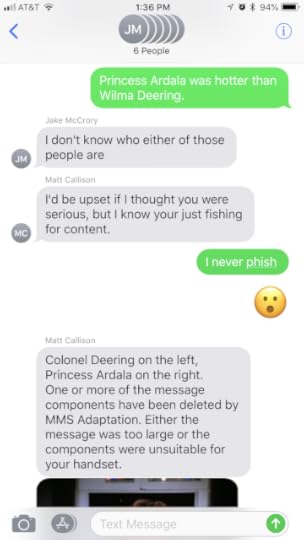
 "MC" is Matt Callison. Anyway, this was solid entertainment on a workday afternoon.
"MC" is Matt Callison. Anyway, this was solid entertainment on a workday afternoon.
 And below is an argument I started on another day. This one was mostly aimed at Matt Callison, a friend who is my age in our D&D group (the rest are younger and one is even a teenager), and who has his finger squarely on the pulse of pop-culture. The initial "insult" in green (mine) was totally aimed at trolling Matt. And I was pleased that it worked. Just to give context...there was no lead up to this...no discussion of the very old t.v. show "Buck Rogers in the 25th century." Essentially, if you hadn't lived through it, you'd have no idea what I was talking about (which was the complete point of the whole exercise to begin with).
And below is an argument I started on another day. This one was mostly aimed at Matt Callison, a friend who is my age in our D&D group (the rest are younger and one is even a teenager), and who has his finger squarely on the pulse of pop-culture. The initial "insult" in green (mine) was totally aimed at trolling Matt. And I was pleased that it worked. Just to give context...there was no lead up to this...no discussion of the very old t.v. show "Buck Rogers in the 25th century." Essentially, if you hadn't lived through it, you'd have no idea what I was talking about (which was the complete point of the whole exercise to begin with).

 "MC" is Matt Callison. Anyway, this was solid entertainment on a workday afternoon.
"MC" is Matt Callison. Anyway, this was solid entertainment on a workday afternoon.
Published on July 01, 2018 23:05



